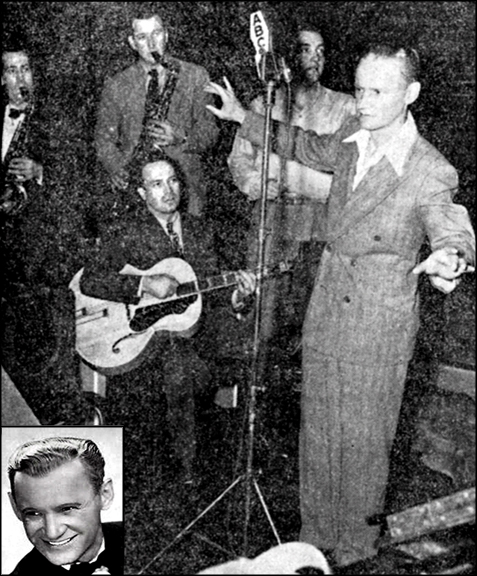My mother was a huge fan of big band music in the 1940s, preferring “sweet” as opposed to “swing” bands. Although orchestras tended to focus on one genre or the other, most leaders incorporated a blend of each to satisfy their customers’ voracious musical appetites. Mom’s favorites were Guy Lombardo (“The Sweetest Music This Side of Heaven”), Sammy Kaye (“Swing and Sway with Sammy Kaye)” and Russ Morgan (“Music in the Morgan Manner”).
As a young lad, I also listened to the likes of Count Basie, Cab Callaway, Frankie Carle, Tommy Dorsey, Jimmy Dorsey, Duke Ellington, Shep Fields, Jan Garber, Benny Goodman, Woody Herman, Harry James, Wayne King, Kay Kiser, Ted Lewis, Johnny Long, Glenn Miller, Tony Pastor, Artie Shaw, Orrin Tucker, Ted Weems and others.
Local radio station WJHL, affiliated with NBC’s “Blue Network,” (comprised of cultural and news programming) routinely held contests that awarded a prize to the first person to call the station and correctly identify the band being played from a 78-rpm record.
About 1948, Mom won a contest and received $25 worth of groceries from Cut Rate Supermarket at 410 W. Walnut Street. I had never seen that much foodstuff at one time. We stacked it on the floor under our apartment dining room window. It took several weeks of hardy ingestion to make a dent in the victuals.

Sammy Kaye became known for a unique radio program that debuted in 1941 titled, “Sunday Serenade.” It was heard over NBC’s “Red Network” (consisting of entertainment and music) each Sunday afternoon from 2:00 to 2:15 Eastern Standard Time. Between 1942 and 1945, it was aired at the same time on Eastern War Time (the equivalent today of year-round Eastern Daylight Savings Time). The show eventually was expanded to 30 minutes and remained on the air into the 1950s.
The Sunday afternoon lineup featured performances from the band; the Kaye Choir; The Three Kaydettes, vocal trio; solo vocalists, Billie Williams and Nancy Norman; and special guests. The group’s two most recognized hits of that era were “Harbor Lights” and “The Old Lamplighter.”
Kaye's “Sunday Serenade” was a compilation of soothing music and thought-provoking poetry, submitted by amateur wannabe lyricists. The show became so popular that it spawned several books of poetry. Republic Music Corporation published a 66-page book in 1942 containing 49 poems. Sammy Kaye wrote a brief foreword to the work:
“This volume is printed in answer to the requests of thousands of our ‘Sunday Serenade’ listeners. If it can provide some measure of encouragement, comfort or just enjoyment, we shall have fulfilled our aim in bringing it to you. In selecting poetry for our broadcasts, we always try to find poems that will strike a responsive chord in the hearts of our listeners. We have also been fortunate in securing selections from the works of several poets who have achieved a distinct place in the field of literature.”
A typical stanza from the book reads: “And when the shadows of life may fall; On the hopes that rise in the hearts of all; When you are gone – oh, come what may; There are memories never to pass away.” (Eugene Hall).
The most remembered episode of “Sunday Serenade” occurred on Dec. 7, 1941 when announcer Ben Grauer broke in to reveal the shocking news that Japan had attacked Pearl Harbor. One prophetic song played during the broadcast was “This Is No Laughing Matter.” In response to the bombing, Kaye penned the song, “Remember Pearl Harbor,” which became an instant rallying war cry with the public.
_0-477x400.jpg)
Comments are closed.